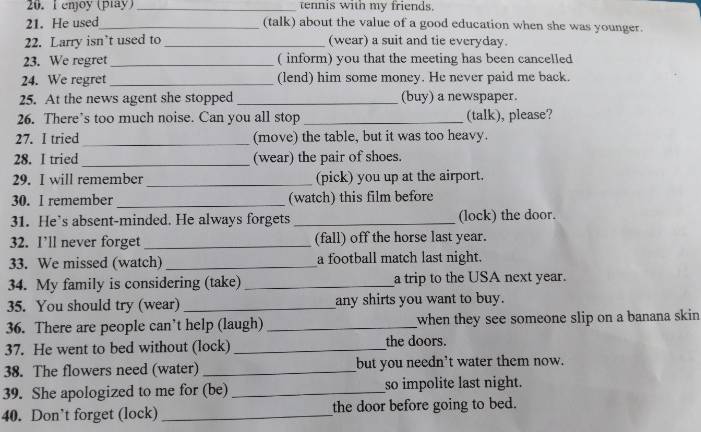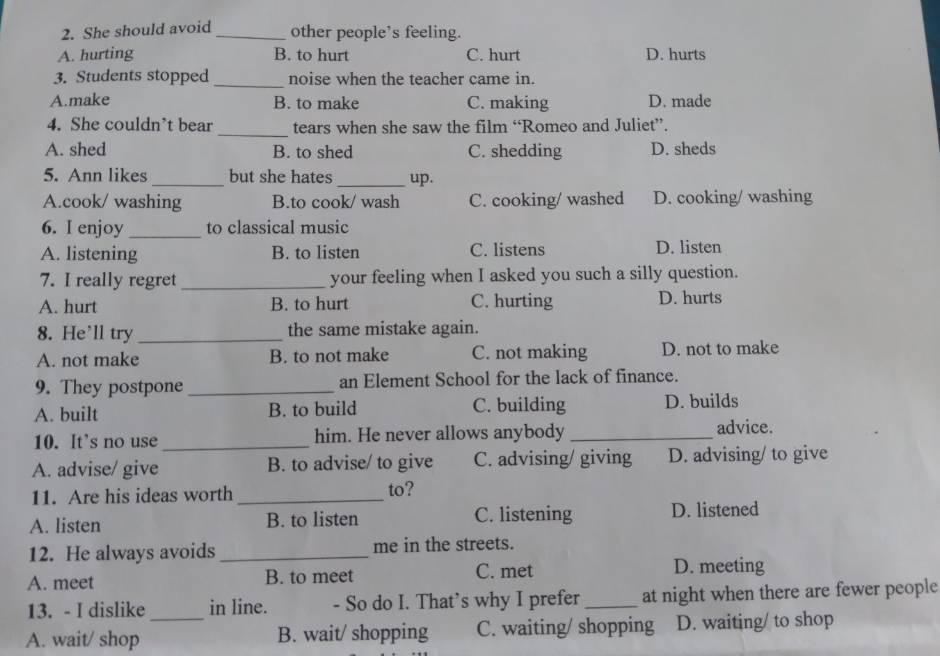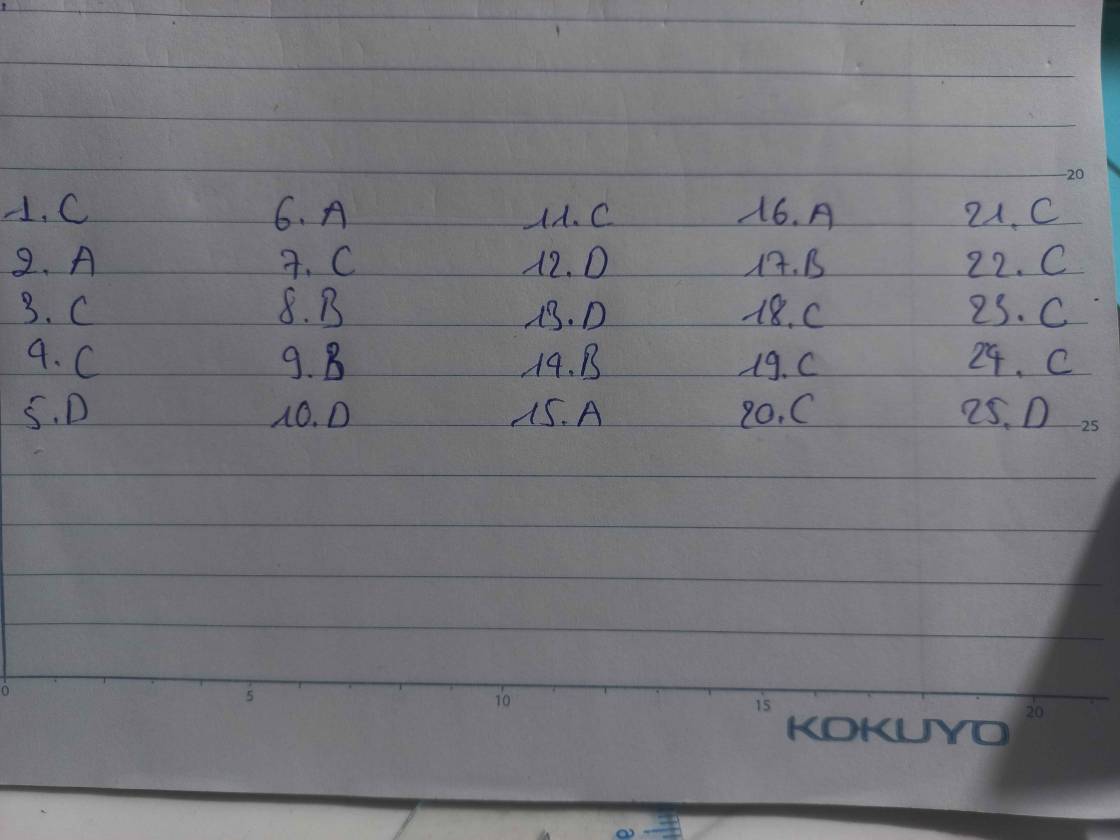Gerunds
AN
Những câu hỏi liên quan
Work in pairs. Put the verbs in the appropriate column.

| Verbs followed by gerunds only | Verbs followed by both gerunds and to-infinitives |
Cột 1: detest, fancy, dislike, enjoy.
Cột 2: love, like, hate, prefer.
Đúng 2
Bình luận (0)
Verbs followed by gerunds only (Động từ chỉ được theo bởi danh động từ) | Verbs followed by both gerunds and to-infinities (Động từ theo bởi cả danh động từ và động từ nguyên mẫu có to) |
detest: ghét cay ghét đắng fancy: yêu thích, si mê dislike: không thích, ghét enjoy: thích thú, tận hưởng | love: yêu like: thích hate: ghét prefer: thích hơn, ưa hơn |
Đúng 0
Bình luận (0)
Gerunds.
20 playing
21 to talk
22 wearing
23 to inform
24 lending
25 to buy
26 talking
27 to move
28 wearing
29 picking
30 watching
31 to lock
32 falling
33 watched
34 taking
35 wearing
36 laughing
37 locking
38 watering
39 being
40 to lock
Đúng 1
Bình luận (0)
Gerunds


1 A
2 A
3 C
4 C
5 D
6 A
7 C
8 D
9 C
10 D
11 C
12 D
13 D
14 B
15 A
16 A
17 B
18 C
19 C
20 C
21 C
22 C
23 C
24 C
25 D
Đúng 0
Bình luận (0)
Cho công thức,cách sử dụng,dấu hiệu nhận biết của thì Gerunds
GERUND (V-ing): Danh động từ
* Danh động từ có thể được dùng làm:
- Chủ từ của câu: Swimming is my favourite sport.
- Bổ ngữ của động từ: My hobby is collecting stamps.
- Tân ngữ của động từ: I enjoy traveling.
* V + V-ing
- Sau các động từ: enjoy, avoid, admit, appreciate (đánh giá cao), mind (quan tâm, ngại), finish, practice, suggest, postpone (hoãn lại), consider (xem xét), hate, admit (thừa nhận), like, love, deny (phủ nhận), detest (ghét), keep (tiếp tục), miss (bỏ lỡ), imagine (tưởng tượng), mention, risk, delay (trì hoãn), ….
- Sau các cụm động từ: cant’ help (không thể không), can’t bear / can’t stand (không thể chịu được), be used to, get used to, look forward to, it’s no use / it’s no good (không có ích lợi gì), be busy, be worth (đáng giá)
- Sau giới từ: in, on, at, from, to, about …
- Sau các liên từ: after, before, when, while, since,…
Ex: You should lock the door when leaving your room.
- S + spend / waste + time / money + V-ing
Ex: I spent thirty minutes doing this exercise.
Đúng 0
Bình luận (0)
a. Stress the first syllable for the most gerunds.
(Nhấn mạnh vào âm đầu tiên cho hầu hết các danh động từ.)
các động từ thích verb of liking: verb nào đi với gerunds verb + to- infinitives
to+ V and gerund: like, love, prefer, dislike, hate
gerund: enjoy, adore, fancy, don't mind, detest
p.s: còn nhiều lắm nhưng những từ đó là trong chương trình học
Đúng 0
Bình luận (0)
- Sau dislike, enjoy, hate, like, prefer để diễn đạt sở thích chung ta dùng danh động từ (động từ thêm -ing).
Ex: She likes drawing. Cô ấy thích vẽ.
- Các động từ chỉ sở thích (Verbs of liking) theo sau bởi dạng thêm -ing (G) hoặc dạng nguyên mẫu có to (to-infìnitive) của động từ mà không có sự thay đổi về nghĩa. Đó là love (yêu, thích), like (thích) prefer (thích hơn) và hate (ghét).
Ex: Trang loves going out with her friends
Đúng 0
Bình luận (1)
Gerounds: V-ing
To- infinitives: to V
Đúng 0
Bình luận (0)
Xem thêm câu trả lời
Work in pairs. Make sentences, using perfect gerunds and perfect participle clauses.
Example:
Having completed the project gave us a feeling of satisfaction.
Having finished school, I can apply to university.
Tham khảo:
1. Having learned how to cook, he enjoys making new dishes for his friends.
2. Having visited New York before, I am not planning to go there on this trip.
3. Having finished the book, she decided to write a review of it.
4. Having missed the last bus, they had to walk home in the rain.
5. Having studied abroad for a year, she returned home with a new perspective on life.
Đúng 3
Bình luận (0)
Rewrite the sentences using perfect participles or perfect gerunds:
1.Since he had spent his childhood in Manchester, he knew the city well.
............................................................................
2.Denis had taken an active part in the Green Summer activities.He was rewarded for that.
............................................................................
3.He had dumped lots of rubbish onto the beach.He denied it.
.........................................................
Đọc tiếp
Rewrite the sentences using perfect participles or perfect gerunds: 1.Since he had spent his childhood in Manchester, he knew the city well. =>............................................................................ 2.Denis had taken an active part in the Green Summer activities.He was rewarded for that. =>............................................................................ 3.He had dumped lots of rubbish onto the beach.He denied it. =>............................................................................ 4.You had saved the lives of hundreds of wild animals.Thank you for that. =>............................................................................ II.Rewrite the sentences, using the prensent perfect or the prensent perfect continuous. 1.She started writing this essay hours ago.She hasn't finished it yet(for). =>............................................................................ 2.The last time I saw Nick was in 1995.(sinces) =>............................................................................ 3.Eating Chinese food is new to her.(never) =>............................................................................
Rewrite the sentences using perfect participles or perfect gerunds:
1.Since he had spent his childhood in Manchester, he knew the city well.
=> Having spent his childhood in Manchester, he knew the city well.
2.Denis had taken an active part in the Green Summer activities.He was rewarded for that.
=> Having taken an active part in the Green Summer activities, he was rewarded for that.
3.He had dumped lots of rubbish onto the beach.He denied it.
=> He denied having dumped lots of rubbish onto the beach.
4.You had saved the lives of hundreds of wild animals.Thank you for that.
=> Thank you for having saved the lives of hundreds of wild animals.
II.Rewrite the sentences, using the prensent perfect or the prensent perfect continuous.
1.She started writing this essay hours ago.She hasn't finished it yet(for).
=> She has been writing this essay hours ago.
2.The last time I saw Nick was in 1995.(sinces)
=> I haven't seen Nick since 1995.
3.Eating Chinese food is new to her.(never)
=> She has never eaten Chinese food before.
Đúng 1
Bình luận (0)
UNIT 1.Verbs of liking + gerunds - Verbs of liking + to-infinitives1. Students enjoy ............. to music and ................... out with friends.A. listen - hang. B. to listen - to hang. C.listening - hang. D. listening - hanging.2. They love ........................ with friends.A. eat out. B. ate out. C . eating out. D. to eating out.3. Does she ẹnjoy ..................... book s to the younger children every night ?A. reads. ...
Đọc tiếp
UNIT 1.Verbs of liking + gerunds - Verbs of liking + to-infinitives
1. Students enjoy ............. to music and ................... out with friends.
A. listen - hang. B. to listen - to hang. C.listening - hang. D. listening - hanging.
2. They love ........................ with friends.
A. eat out. B. ate out. C . eating out. D. to eating out.
3. Does she ẹnjoy ..................... book s to the younger children every night ?
A. reads. B. reading. C . to reading D. read.
4. My parents want .................... on sundays.
A.gadren . B. gadrening . C .gadrened. D. to gadren .
5. Teenagers enjoy .............. books and.......... out with their friends in their free time.
A.read - hang. B.to read - to hang . C . reading - hang D.reading - hanging.
1. Students enjoy ............. to music and ................... out with friends.
A. listen - hang. B. to listen - to hang. C.listening - hang. D. listening - hanging.
2. They love ........................ with friends.
A. eat out. B. ate out. C . eating out. D. to eating out.
3. Does she ẹnjoy ..................... book s to the younger children every night ?
A. reads. B. reading. C . to reading D. read.
4. My parents want .................... on sundays.
A.gadren . B. gadrening . C .gadrened. D. to gadren .
5. Teenagers enjoy .............. books and.......... out with their friends in their free time.
A.read - hang. B.to read - to hang . C . reading - hang D.reading - hanging.
Đúng 1
Bình luận (0)







